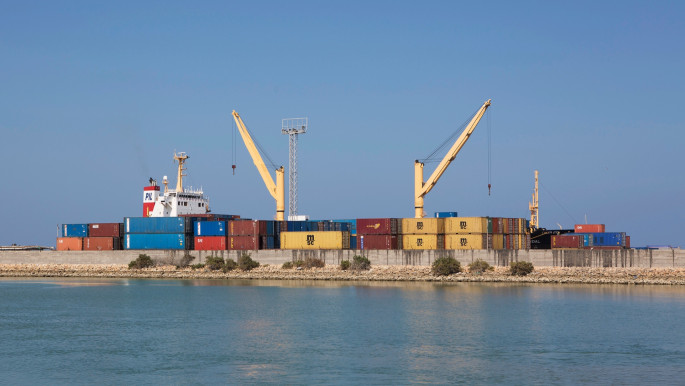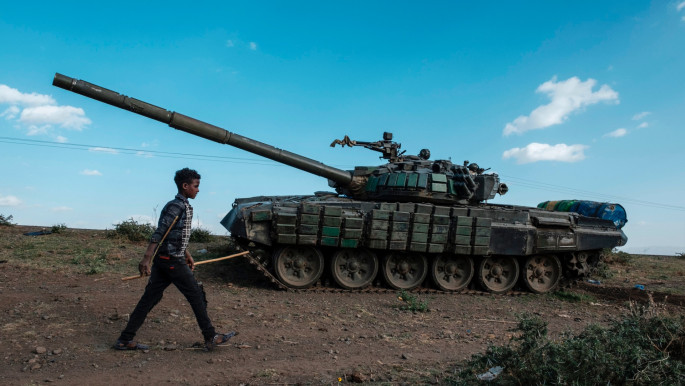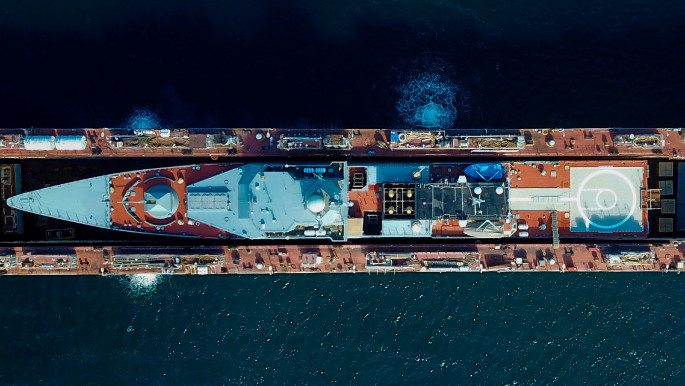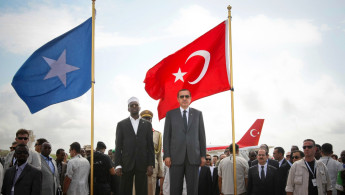Turkey's growing influence in the Horn of Africa
Completed in the last decade, the two mosques signal Ankara's interest in cultivating relations with East African countries and ensuring its visibility in a region where Turkey has considerably increased its profile in the last decade.
Turkey distinguishes itself from Africa's European, Chinese and American partners through its shared religious identity with the region, says Ann Fitz-Gerald, Director of the Balsillie School of International Affairs and an East Africa security analyst. This common ground allows it to build on its reputation as a long-term NATO member and trusted economic partner.
In Djibouti, the Abdulhamid Han II Mosque, with a capacity of 6,000, is the largest in the country. The project came about during a 2015 visit by President Recep Tayyip Erdogan to Djibouti, where President Ismail Omar Gulleh told him that he wanted to see an Ottoman mosque in his capital.
Turkey's parliamentary speaker Mustafa Sentop attended its inaugural Friday prayer in 2019 when it opened to the public. In December 2017, Gulleh returned the favour, his third visit to Turkey, at which point relations between the countries had already been gaining momentum.
 |
Turkey is interested in cultivating relations with East African countries and ensuring its visibility in a region where Ankara has considerably increased its profile in the last decade |  |
Turkish Airlines has direct flights between the countries, while TIKA, Turkey's aid agency, has established offices and projects across Djibouti. By 2018, Turkey agreed to finance and construct the Ambouli Friendship Dam.
Turkey's ambassador to Djibouti said that whilst the mosque project was "socially and architecturally important", the dam would have a tangible impact in water management in a flood prone part of the country.
Djibouti's ambassador to Turkey told Daily Sabah that his country wants to provide room for Turkey in the region because it views Turkey as a "strategic partner".
In Somalia, the presence of the Turkish state has also been much more visible following a high profile visit by president Erdogan to Mogadishu in 2011, making him the first non-African leader to visit the country in twenty years.
 |
|
| Read more: Troubled waters: Ports and power in the Horn of Africa |
Five years later, Turkey opened its largest overseas embassy in Mogadishu and began cooperating with Somali authorities in a variety of fields, from health and infrastructure to education and security.
Relations between the countries initially focussed on humanitarian challenges, says Abdinor Dahir, a researcher at TRT World Research Centre, but Turkey noticed early on how much potential there was in Somalia.
"Between 2011 and 2013, Somalia was struggling with famine and the relationship focussed on humanitarian issues," Dahir told The New Arab. "After that the relationship became more comprehensive and expanded into development assistance and state-building."
This assistance involves everything from the mundane equipping of government ministries, to more complex challenges such as training cadets at Camp TURKSOM for the Somali National Army, Dahir said, and differentiates Turkey from other MENA powers in that it has the capacity to deliver high level development assistance.
Additional Somali troops have also enrolled in commando training programs in the southwestern Turkish province of Isparta, with a batch of elite units returning in early March.
Whilst security cooperation has played an important role in bilateral relations, Turkish construction firms have completed critical projects in the country, including building Somalia's new parliament.
 |
Turkey distinguishes itself from Africa's European, Chinese and American partners through its shared religious identity with the region |  |
"Ten years of trust-based relationship building with Somalia has enabled infrastructural and business investments that added a tangible element to its soft power diplomacy," Fitz-Gerald told The New Arab.
In a widely publicised official visit to Ankara, Somalia's Turkish-educated justice minister joked that "it wouldn't be a lie to say that Turkish has become the second language of Somalia." Turkey's efforts have borne fruit with Somali officials.
In February, Middle East Eye reported that Turkey intended to launch its mission to the moon from Somalia. Local media also reported in early 2020 that Turkey was invited by Somalia to explore its seas for oil.
Turkey's support for Somalia's fledging central government, however, hasn't come without a cost. Earlier this year two Turkish nationals working on a road between Mogadishu and Afgoye were killed in an attack by Al-Shabab.
A similar attack targeting the Turkish project killed 79 Somali nationals and wounded Turkish engineers in late 2019. In the summer of 2020, Al-Shabab conducted an attack on the Turkish base in Mogadishu.
Somalia is now also locked in a political crisis which has threatened to embroil Somalia's Turkish trained Gorgor and Haramad elite units. Opposition politicians alleged that Turkish and American trained forces were used against them to suppress protests, urging those commanders to be dismissed and for the military to remain out of politics.
Turkey recently offered its support in resolving Somalia's electoral crisis, with reports indicating a possible visit by foreign minister Mevlut Cavusoglu to Mogadishu soon.
 |
|
| Read more: What will Biden's presidency mean for the Horn of Africa? |
Turkey's security footprint has also grown beyond Somalia and has attracted the attention of East Africa's two hegemon's, Kenya and Ethiopia, whose interests have a nexus point in Somalia where both are important players in the country's security matrix.
Kenyan and Ethiopian peacekeepers have supported the Somali government's fight against Al-Shabab as part of AMISOM, an African Union mission to help stabilise the country. Troops from both countries are also deployed bilaterally in various parts of southern Somalia.
"Both Ethiopia and Kenya have long-invested in the fight against Al-Shabaab," Fitz-Gerald says, "and will wish to see Turkey continue its military cooperation in Somalia by propping up the capacity of the Somali National Army to defend against this ongoing terrorist threat."
The Turkish approach in East Africa differs from West Africa, says Abdinoor Dahir, in that Turkey "has ended up on a collision course with France which is a major power in West Africa. In the Horn, Turkey didn't challenge traditional regional powers or their interests but looked to build ties based on trust and common interests."
Earlier this year, Kenya's military ordered 118 Hizir four-wheel drive personnel carriers from Turkish manufacturer Katmerciler. The purchase, intended to help in Kenya's fight with Somali militant group Al-Shabab, introduced Turkish armoured vehicles to the African market.
 |
Turkey has carved out a niche role through its projection of soft power, economic development and security engagement in the Horn of Africa |  |
A month after the order was placed, reports began to emerge about a role for Turkey in an ongoing maritime dispute between Somalia and Kenya over an energy rich triangle which juts out from their shared border.
"Turkey is one of the most influential countries in the Horn of Africa," says Peter Kagwanja of the Nairobi based Africa Policy Institute. "To construct new engagements, we need to craft wide frameworks, project regional power and anchor it in sustainable partnerships with Turkey."
Ethiopia, one of Africa's largest markets and fastest growing economies, has also been an important target of Turkish diplomacy and investment. In early February, Ethiopian FM Demeke Mekonnen visited Ankara to inaugurate the Ethiopian embassy's new building in Ankara where the Turkish FM Cavusoglu was also present.
Speaking at the ceremony, Cavusoglu recounted the historical ties between the countries dating back to 1896, but the focus of the event was very much on the present and future of bilateral ties.
 |
|
| Read more: A gateway to Africa: Russia's new naval base in Sudan |
Turkey today is the second largest foreign investor in Ethiopia after China, according to the Ethiopian Investment Commission, and has close to 200 companies employing 20,000 people.
Whilst Turkish businesses have faced some challenges in Ethiopia's difficult business climate, in the fields of clothes and textiles Turkish products have made gains in Addis Ababa's makeshift markets and stores in recent months, with shop owners preferring to import their goods from Turkey rather than Dubai.
"We lacked a good sense of judgement to navigate and forecast the changes, but we know now, and we're sticking with Turkey," one shop owner told Addis Fortune.
Ankara's outreach even led Ethiopia to signal its openness to Turkish mediation in its border conflict with Sudan during FM Demeke Mekonnen's visit to Turkey.
Positive developments in relations between Turkey and Egypt also led Turkey to offer its mediation between Cairo and Addis Ababa on the Nile dam dispute.
Turkey has carved out a "niche role" says Anne Fitz-Gerald through its projection of soft power, economic development and security engagement in the Horn of Africa. Abdinoor agrees, and adds that Turkey's diplomacy and investment have turned it from an actor with little presence, to a country that all in the region are interested in upgrading ties with.
Faisal Ali is an Istanbul based multimedia journalist. He writes about East African politics.
Follow him on Twitter: @fromadic92



